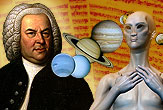If Aliens Exist, They Will Probably Love Bach

SANTA CLARA, Calif. – If we ever make contact with aliens, they might be more interested in learning about Van Gogh and Bach than Einstein or Newton, scientists said Saturday.
Art may attract aliens more than academics because any extraterrestrial civilization that we are able to get in touch with is likely to be much older than us and more technically advanced, researchers said here at the SETIcon conference on the search for extraterrestrial intelligence.
Humans would probably have little to teach them about science and mathematics that they don't already know, the theory suggests. However, our art and music is singularly human, and could likely be fascinating to an alien species.
"What would the other guys want to know about us? What in the world do we have to offer?" asked Douglas Vakoch, director of interstellar message composition at the SETI (Search for Extraterrestrial Intelligence) Institute in Mountain View, Calif. "If they're so advanced, we probably can't teach them about science, but we can tell them what it's like to be at this precarious point where we don’t know if we're going to continue as a species."
Advanced alien civilizations will probably have overcome the issues that threaten adolescent species like our own, such as how to live sustainably without degrading the planet, and how not to destroy ourselves with biological or technical warfare, Vakoch said. Advanced extraterrestrials might even have forgotten what it's like to live as we do, with the future in question. And the best way to teach them about what it's like to be human may be through art and music, Vakoch added.
However, aliens are likely to be so different from us that it will be difficult for them to understand our art.
We may do best to present works based on the language and patterns of mathematics, which might be more universal, Vakoch said.
Breaking space news, the latest updates on rocket launches, skywatching events and more!
Pierre Schwob, author and creator of the classical music repository ClassicalArchives.com, suggested that a piece like Bach's "Goldberg Variations," which is built on mathematical patterns, might be particularly accessible to extraterrestrials.
"If anything I would think, yes, any civilization whatsoever would gather that this is extraordinarily beautiful," Schwob said. "But we really don’t have any idea what would be appreciated by an alien civilization." [10 Alien Encounters Debunked]
He said other works by Bach, Vivaldi, and other Baroque composers could be a good bet because they are fairly regular and harmonic.
"What about Lady Gaga?" a member of the audience asked, referring to the American pop singer.
"I won't even go there," Schwob replied.
As for visual art, comic book artist Paul Duffield suggested showing extraterrestrials examples of Pre-Raphaelite paintings.
"The richly three-dimensional, almost photographic representation could be more easily interpretable," he said. "And it's very expressive."
Likewise, learning about how aliens create art could be one of the most interesting aspects of making contact.
"If we could ask only one question, I think maybe not 'Do you have religion?' but, 'Do you have music?'" would be best, said SETI senior astronomer Seth Shostak.
SETIcon is being held this year to celebrate the 50th anniversary of the first modern experiment aimed to search for intelligent life beyond Earth, called Project Ozma.

Clara Moskowitz is a science and space writer who joined the Space.com team in 2008 and served as Assistant Managing Editor from 2011 to 2013. Clara has a bachelor's degree in astronomy and physics from Wesleyan University, and a graduate certificate in science writing from the University of California, Santa Cruz. She covers everything from astronomy to human spaceflight and once aced a NASTAR suborbital spaceflight training program for space missions. Clara is currently Associate Editor of Scientific American. To see her latest project is, follow Clara on Twitter.
